
PUMPA - SMART LEARNING
எங்கள் ஆசிரியர்களுடன் 1-ஆன்-1 ஆலோசனை நேரத்தைப் பெறுங்கள். டாப்பர் ஆவதற்கு நாங்கள் பயிற்சி அளிப்போம்
Book Free DemoVitamins are essential for carrying out different biochemical reactions that take place in the body. In addition, vitamins are necessary for the immune system to fight against diseases. Thus, vitamins are called protective food.
Example:
Fruits, vegetables, whole grains, meat products are sources of vitamins.
There are six major vitamins available in various foods such as vitamin A, vitamin C, vitamin D, vitamin E, vitamin K, and vitamin B (group of vitamins such as B1, B2, B12, etc.).
The vitamins B and C are water-soluble, while the other vitamins A, D, E, and K are fat-soluble.
Fat-soluble vitamins:
Vitamin A:
Vitamin A is a fat-soluble vitamin. It is good for vision, skin, immune system, and cells' growth. Vitamin A is vital for effective eyesight and healthy skin.
The sources of vitamins include fish liver oil, eggs, milk, ghee, carrot, corn, greens, papaya, mango, and orange and yellow fruits/vegetables.
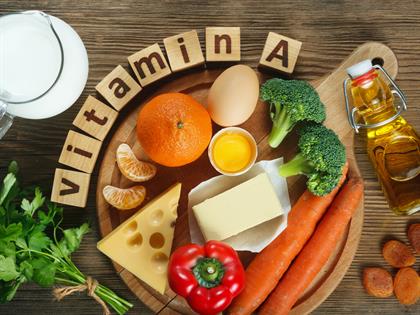
Sources of vitamin A
Symptoms of vitamin A deficiency include poor vision and difficulty in seeing in dim light. Vitamin A is necessary for the formation of pigment in the retina. Thus, the deficiency (inadequate uptake/lack/shortage) of vitamin A cause night blindness.
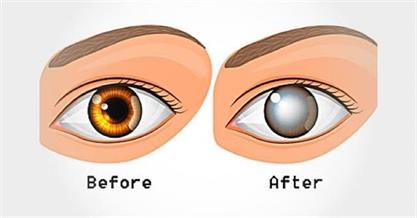
Deficiency in Vitamin A causes night blindness.
Vitamin D:
Vitamin D is a fat-soluble vitamin present in a few foods like fish liver oil, milk, mushroom, yoghurt, fishes like salmon and mackerel, and eggs.
Vitamin D is made endogenously in the skin using UV rays. Vitamin D promotes the absorption of calcium and phosphorus in the gut to maintain strong bones and enables normal bone mineralisation.
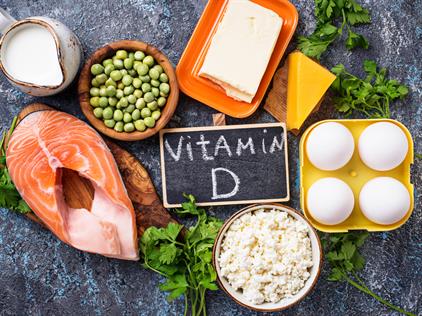
Sources of vitamin D
The symptoms of Vitamin D deficiency causes muscle weakness, pain, weak and flexible bones. In addition, the deficiency of Vitamin D causes rickets. Rickets is a bone disease that affects infants and young ones. The child's growing bones fail to develop properly due to the shortage or lack of vitamin D. This results in soft and weakened bones, fractures, bone and muscle pain, and bone deformities.
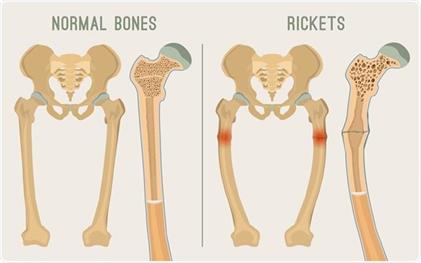
Bones bent due to rickets.
Important!
Sunscreen lotion reduces the ability of the skin to produce vitamin D by up to nearly 95\%. This leads to deficiency in Vitamin D in the body.
Vitamin E:
Vitamin E is also a fat-soluble vitamin present in vegetable oils, whole wheat, green leafy vegetables, apple, mango, sunflower seeds, peanut butter and almonds.
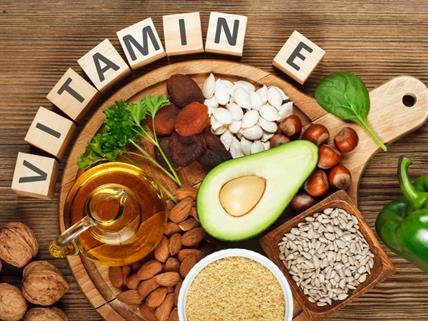
Sources of vitamin E
Vitamin E deficiency symptoms include lack of resistance power to illnesses, childlessness or sterility. In addition, Vitamin E deficiency causes nervous weakness, muscle weakness that causes loss of body movement control, and dimming of eyesight.
Vitamin K:
Vitamin K is a fat-soluble vitamin that plays a major role in blood clotting, prevents excessive bleeding and is also helpful in metabolism.
Green leafy vegetables like spinach, cabbage, tomato, mustard, cereals, eggs, and milk products are sources of vitamin K.
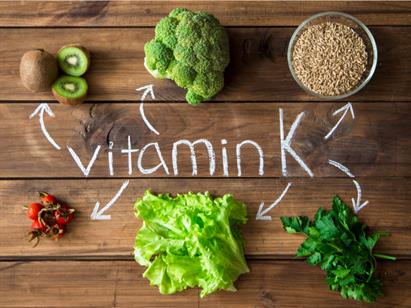
Sources of vitamin K
Vitamin K deficiency symptoms include easy bruising, bleeding profusely, even for a small cut. The deficiency of vitamin K cause weakness of bone and teeth, poor bone development, osteoporosis, and increased cardiovascular disease.
Excessive deficiency of vitamin K can lead to haemorrhagic in newborn, in which the blood flow will not stop for a long time.